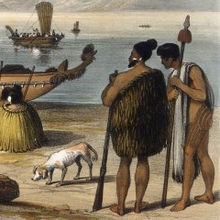- Kurī
-
Kurī 
Country of origin New Zealand Traits Classification and standards Extinct Dog (Canis lupus familiaris) Kurī is the Māori language name for the Polynesian dog. It was introduced to New Zealand by Māori during their migrations from East Polynesia sometime around 1280 AD. It was used by Māori as a food source[1] and the skin and hair was used for making dog-skin cloaks Kahu kurī[2], belts,[3] decorating weapons[4][5], and poi[6].
The kurī became extinct in New Zealand some time after the arrival of European settlers. The last known specimens, a female and her pup, are now in the collection of the Museum of New Zealand Te Papa Tongarewa.[7]
See also
References
- ^ "'DOG, MAORI', from An Encyclopaedia of New Zealand, edited by A. H. McLintock, originally published in 1966". Te Ara - the Encyclopedia of New Zealand, updated 22-Apr-09. Ministry for Culture and Heritage / Te Manatū Taonga. http://www.TeAra.govt.nz/en/1966/dog-maori/1. Retrieved 5 March 2007.
- ^ "Kahu kuri (dog skin cloak)". Collections Online. Museum of New Zealand Te Papa Tongarewa. http://collections.tepapa.govt.nz/objectdetails.aspx?oid=68853. Retrieved 20 July 2010.
- ^ "Tatua (belt)". Collections Online. Museum of New Zealand Te Papa Tongarewa. http://collections.tepapa.govt.nz/objectdetails.aspx?oid=53958. Retrieved 20 July 2010.
- ^ "Edged Weapons with dogskin in the Taonga Māori Collection". Collections Online. Museum of New Zealand Te Papa Tongarewa. http://collections.tepapa.govt.nz/search.aspx?advanced=colCollectionType:%22Taonga+Maori%22+colClassification:%22edged+weapons%22+colMaterials:%22dogskin%22+colCollectionGroup:CH. Retrieved 20 July 2010.
- ^ "Edged Weapons with dog hair in the Taonga Māori Collection". Collections Online. Museum of New Zealand Te Papa Tongarewa. http://collections.tepapa.govt.nz/search.aspx?advanced=colCollectionType:%22Taonga+Maori%22+colClassification:%22edged+weapons%22+colMaterials:%22dog+hair%22+colCollectionGroup:CH. Retrieved 20 July 2010.
- ^ "Poi awe (percussive device)". Collections Online. Museum of New Zealand Te Papa Tongarewa. http://collections.tepapa.govt.nz/objectdetails.aspx?oid=65427. Retrieved 20 July 2010.
- ^ "Canis lupus familiaris". Collections Online. Museum of New Zealand Te Papa Tongarewa. http://collections.tepapa.govt.nz/search.aspx?term=Kahu%20kuri%20(dog%20skin%20cloak). Retrieved 20 July 2010.
- http://www.nzetc.org/tm/scholarly/tei-ColNote-t1-body.html
- http://www.nzetc.org/tm/scholarly/Bes01Maor-fig-Bes01Maor433a.html
Extinct dog breeds Alaunt · Alpine Mastiff · Alpine Spaniel · Blue Paul Terrier · Braque du Puy · Bullenbeisser · Chien-gris · Chiribaya Shepherd · Cordoba Fighting Dog · Cumberland Sheepdog · Dogo Cubano · English Water Spaniel · English White Terrier · Hare Indian Dog · Hawaiian Poi Dog · Hunting Dog (Felids) · Kurī · Molossus · Moscow Water Dog · Norfolk Spaniel · North Country Beagle · Old English Bulldog · Paisley Terrier · Rastreador Brasileiro · Salish Wool Dog · Southern Hound · St. John's Water Dog · Tahltan Bear Dog · Talbot · Tesem · Toy Bulldog · Toy Trawler Spaniel · Turnspit Dog · Tweed Water SpanielCategories:- Dog stubs
- Māori stubs
- Extinct dog breeds
- Māori words and phrases
- Extinct animals of New Zealand
- Meat dogs
Wikimedia Foundation. 2010.
